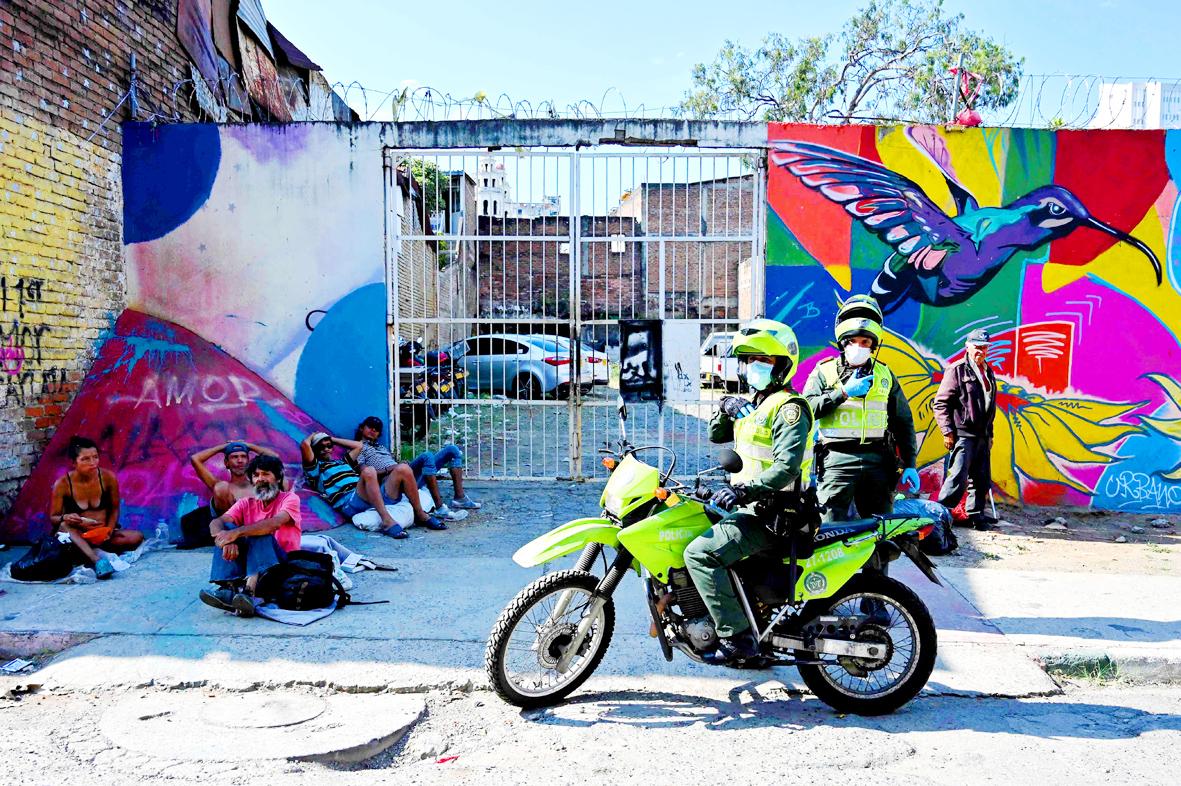Death squads in Colombia are taking advantage of coronavirus lockdowns to murder rural activists, local non-governmental organizations have warned.
When cities across the country introduced local quarantine measures last week, three social leaders were killed, and as the country prepares to impose a national lockdown today, activists have warned that more murders would follow.
High-profile activist Marco Rivadeneira was murdered in southern Putumayo Department, Alexis Vergara was shot dead in western Cauca Department and Ivo Humberto Bracamonte was killed on the eastern border with Venezuela.

Photo: AFP
Colombia is one of the most dangerous countries in the world for activists and community leaders, who often fall foul of armed groups fighting for territory.
Since a historic peace deal was implemented in early 2017 with the Revolutionary Armed Forces of Colombia (FARC) leftist rebel group, 271 activists have been killed.
Now, with the government focused on the pandemic, activists have said that they are even more at risk.
“I’ve been getting more death threats since everyone started talking about the coronavirus,” said Carlos Paez, a land rights activist in a cattle-ranching region near the northern border with Panama. “One message said that they know who I am — and that now is the time to take me out.”
Some of the armed groups are dissident FARC fighters who refused to hand in their guns; others belong to smaller rebel armies and rightwing paramilitary militias.
Whatever their purported ideology, all make their money in drug trafficking, illegal mining and extortion rackets, and all view social leaders as an obstacle to those lucrative economies.
As the government focuses its resources on stemming the coronavirus outbreak — which has claimed three lives in Colombia amid 277 confirmed cases — normal security protocols have been thrown into disarray.
“They are playing with our lives because they know that our bodyguards, the police and the justice system are going to be even less effective than they usually are,” Paez said. “It’s horrible. I’m scared for my life.”
Colombia’s war with FRC and other armed groups has claimed at least 260,000 lives and forced 7 million people from their homes. Now, with much of the country confined indoors ahead of a 19-day nationwide quarantine that begins today, non-state actors are operating more brazenly.
Activists fear that the nationwide quarantine has put them in a bind. Staying in one place makes them sitting targets, but moving around puts them at risk of infection.
“We are being killed, like always,” said Hector Marino Carabali, a rights activist in Cauca, who usually travels in an armored car with a security detail provided by the government. “The government has taken drastic measures to fight the virus, but done nothing to protect us now or to tell us about how we can do our work. Curfews and lockdowns always affect the most vulnerable.”
The Office of the UN High Commissioner for Human Rights last week reported that armed groups were continuing to commit brutal human rights abuses in Choco Department, where Paez leads a community.
Three people were beheaded, with one executed in front of their village, and a pregnant woman was murdered.
A coalition of local groups and more than 100 rural communities called for a ceasefire among armed groups during the outbreak, saying that “the emergency situation deserves our focus as a country and as a society to take on this challenge.”

FRAUD ALLEGED: The leader of an opposition alliance made allegations of electoral irregularities and called for a protest in Tirana as European leaders are to meet Albanian Prime Minister Edi Rama’s Socialist Party scored a large victory in parliamentary elections, securing him his fourth term, official results showed late on Tuesday. The Socialist Party won 52.1 percent of the vote on Sunday compared with 34.2 percent for an alliance of opposition parties led by his main rival Sali Berisha, according to results released by the Albanian Central Election Commission. Diaspora votes have yet to be counted, but according to initial results, Rama was also leading there. According to projections, the Socialist Party could have more lawmakers than in 2021 elections. At the time, it won 74 seats in the

EUROPEAN FUTURE? Albanian Prime Minister Edi Rama says only he could secure EU membership, but challenges remain in dealing with corruption and a brain drain Albanian Prime Minister Edi Rama seeks to win an unprecedented fourth term, pledging to finally take the country into the EU and turn it into a hot tourist destination with some help from the Trump family. The artist-turned-politician has been pitching Albania as a trendy coastal destination, which has helped to drive up tourism arrivals to a record 11 million last year. US President Donald Trump’s son-in-law, Jared Kushner, also joined in the rush, pledging to invest US$1.4 billion to turn a largely deserted island into a luxurious getaway. Rama is expected to win another term after yesterday’s vote. The vote would

CANCER: Jose Mujica earned the moniker ‘world’s poorest president’ for giving away much of his salary and living a simple life on his farm, with his wife and dog Tributes poured in on Tuesday from across Latin America following the death of former Uruguayan president Jose “Pepe” Mujica, an ex-guerrilla fighter revered by the left for his humility and progressive politics. He was 89. Mujica, who spent a dozen years behind bars for revolutionary activity, lost his battle against cancer after announcing in January that the disease had spread and he would stop treatment. “With deep sorrow, we announce the passing of our comrade Pepe Mujica. President, activist, guide and leader. We will miss you greatly, old friend,” Uruguayan President Yamandu Orsi wrote on X. “Pepe, eternal,” a cyclist shouted out minutes later,

A Soviet-era spacecraft plunged to Earth on Saturday, more than a half-century after its failed launch to Venus. Its uncontrolled entry was confirmed by both the Russian Space Agency and EU Space Surveillance and Tracking. The Russians indicated it came down over the Indian Ocean, but some experts were not so sure of the precise location. The European Space Agency’s space debris office also tracked the spacecraft’s doom after it failed to appear over a German radar station. It was not immediately known how much, if any, of the half-tonne spacecraft survived the fiery descent from orbit. Experts said ahead of time